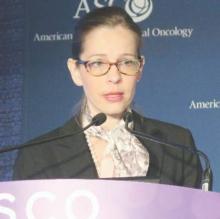Efficacy and safety
After a median follow-up of 6.3 years, the 5-year rate of disease-free survival was 95% with letrozole and 91% with placebo, according to results reported by Dr. Goss in a plenary session at the meeting and simultaneously published (N Engl J Med. 2016. June 5 doi: 10.1056/NEJMoa1604700).
The difference translated to a more than one-third reduction in the risk of disease recurrence or the occurrence of contralateral breast cancer (HR, .66; P = .01). Roughly three-fourths of recurrences were distant.
The groups did not differ significantly with respect to the rate of overall survival, which was 93% with letrozole and 94% with placebo.
The annual incidence of contralateral breast cancer was sharply lower in the letrozole group, at 0.21%, than in the placebo group, at 0.49%, translating to a more than one-half reduction in this risk of this outcome (HR, .42; P = .007).
No new toxicities or emergent symptoms were noted from extending AI therapy, according to Dr. Goss. However, the letrozole group significantly more commonly experienced bone pain (18% vs. 14%), bone fractures (14% vs. 9%), and new-onset osteoporosis (11% vs. 6%). Therefore, “bone health remains important for risk-benefit consideration,” he said.
Patient-reported outcomes
In a separate session and the press briefing, Dr. Julie Lemieux, a researcher at the Centre Hospitalier affilié Universitaire de Québec, reported the trial’s patient-reported outcomes, ascertained from questionnaires completed at baseline and annually out to 5 years.
In general, both the letrozole and placebo groups had small deteriorations over time in global quality of life as assessed from summary scores on the mental and physical scales of the 36-item Short Form Health Survey (SF-36). But both also had small improvements over time in scores on the Menopause-Specific Quality of Life (MENQOL) scale.
When compared, the two groups were statistically indistinguishable on most of these measures. The only significant difference was greater worsening in the letrozole group on the role function-physical subscale of the SF-36, which pertains to difficulty performing work or physical activity due to physical health. However, the difference averaged just 3.2 points, which fell short of the 5 points that the investigators considered clinically important.
“The limitation of this analysis was that it was a highly selected population. All of these women had already tolerated 5 years of an aromatase inhibitor, and about 70% had received 5 years of tamoxifen before,” Dr. Lemieux commented. “Also, they were clinical trial participants.”
Nonetheless, these findings “are very reassuring for those women who want a longer duration of adjuvant endocrine therapy that they can expect a preserved quality of life,” she concluded.
Dr. Goss disclosed that he had no relevant conflicts of interest. Dr. Lemieux disclosed that she had no relevant conflicts of interest. The trial received support from Novartis.


